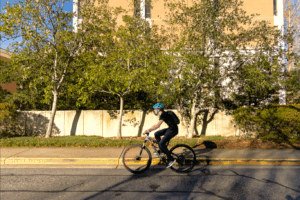
Vulnerable Road Users in a Changing World
We are all witnessing expansive changes in the options available for personal transportation. The choices used to be simple but now, electric scooters and bicycles, skateboards, and hoverboards/one-wheels are transforming how we navigate.
This trend is evident on our campus, where these alternatives are gaining popularity for their convenience and affordability. This freedom, however, also comes with important safety considerations.
Experts refer to users of these devices as “vulnerable road users,” a population with a growing share of all U.S. roadway fatalities. In 2022 alone, more than 230,506 people in the United States visited an emergency room due to a scooter, skateboard, or hoverboard accident.
Research shows that between 2017 and 2022, approximately three million people riding e-bikes, e-scooters, or bicycles sought emergency room care for an injury. In that same time period, e-scooter injuries rose roughly 45%, every year.
Many other accidents with minor injuries occurred that did not require immediate emergency care, amplifying the importance of caution and safety awareness.
Together, we can have a positive impact on the safety of everyone using our roadways. Follow the rules of the road, wear a helmet, and look out for one another.
Follow the rules of the road.
Generally, all wheeled vehicles on the roadway in Georgia are expected to follow the rules of the road. This includes stopping for red lights and stop signs and giving the right of way to pedestrians in crosswalks. Anyone operating a wheeled vehicle in the roadway can be cited for breaking the law.
When accessing sidewalks or crosswalks, users must walk with their e-powered vehicles. Sidewalks and crosswalks are reserved for pedestrian use and not for actively riding a scooter, skateboard, or hoverboard/one-wheel device. Remember to always park and store all gear in designated racks. Scooters left in the wrong areas often block railings and accessible pathways.
Wear a helmet.
Head injuries are particularly dangerous for vulnerable road users. Research shows that wearing a helmet makes a significant difference in an accident. Data show that the clear majority of bicyclists who were involved in fatal accidents were not wearing helmets. It’s simple: Helmets save lives.
Look out for one another.
As a community, we Dawgs need to look out for each other. Drivers in cars need to be aware of vulnerable road users and drive safely. Pedestrians, cyclists, and riders of scooters, hoverboards, and skateboards need to do the same. The National Highway Traffic Safety Administration makes it simple: “A large percentage of crashes can be avoided if motorists and cyclists [and scooter and hoverboard riders] follow the rules of the road and watch out for each other.”
Policy:
- Electric micromobility devices are not allowed inside of University of Georgia buildings or on UGA buses.
- Wheeled personal vehicles, to include bicycles, skateboards, scooters, and electric micromobility devices, may not be used on walkways in designated “mandatory dismount areas” of campus from 8 a.m. to 5 p.m., Monday through Friday. The mandatory dismount areas are highlighted in this map.
- An electric micromobility device is defined as any small, low-speed, electric-powered transportation device, including scooters, electric-assist bicycles (e-bikes), electric scooters (e-scooters), and other small, lightweight, wheeled conveyances (FHWA definition). Wheelchairs and other mobility devices used by persons with disabilities are excluded from this definition, as are vehicles being used for official UGA business.
Frequently asked questions:
- When does this policy go into effect?
August 1, 2025.
- Why are electric micromobility devices not allowed in UGA buildings or on UGA buses?
Electric micromobility devices are not allowed in UGA building or buses for a variety of safety-related reasons. Unfortunately, there have been fires linked to electric micromobility devices in buildings across the country, leading many universities to develop similar policies to prevent this from happening. The use of electric micromobility devices inside of buildings has also led to substantial damage to University property, and especially in housing. Lastly, buses are designed for human transport, and micromobility devices take away room for other passengers.
- Does the policy excluding electric micromobility devices from buildings apply to wheelchairs?
No. Wheelchairs and other mobility devices used by persons with disabilities are excluded from this policy.
- Can electric micromobility devices be secured to bike racks on campus?
Yes. It is strongly recommended that owners secure their electric micromobility devices to an outdoor bicycle rack with a quality lock made for that purpose.
- Can I ride my electric micromobility device on a sidewalk?
No. In Georgia, all vehicles, including electric micromobility devices, scooters, and bicycles, are restricted from riding on sidewalks by state law.
- What is a “mandatory dismount area”?
A mandatory dismount area is a location where wheeled personal vehicles – including bicycles, skateboards, scooters, and electric micromobility devices – may not be used on walkways on campus from 8-5, Monday through Friday.
- What are the potential ramifications of violating the policy described above?
Remember, this policy is about campus safety. Ideally, our entire community will choose to follow the policy voluntarily, and UGA will continue to engage in opportunities to educate the community about traffic safety. However, violation of the policy can result in students being referred to Student Conduct. Employees and visitors violating the policy also face potential sanctions. Where using an electric micromobility device or other wheeled vehicle is forbidden by law, police may make traffic charges as well.
- Does this policy affect the use of motorcycles on campus?
No, as long as Georgia law and other applicable UGA policies are followed.
- Does the policy restrict riders from riding their bicycles, electric micromobility devices or other vehicles on the roadway within the mandatory dismount area?
No. They can continue to use them on the roadway within the mandatory dismount area, as long as they follow Georgia law.
Hear the opinions of UGA students on electric scooters and other micromobility devices.
Additional traffic safety tips can be found here.
